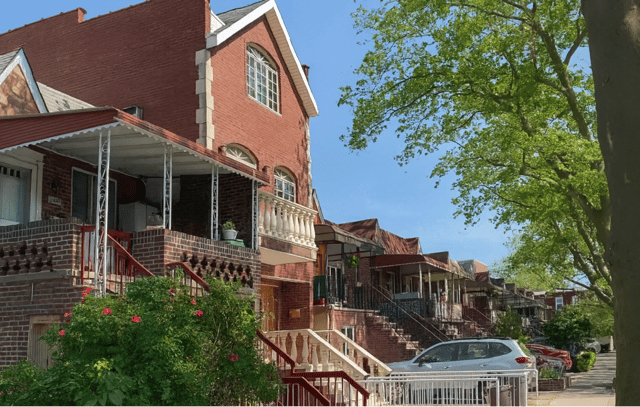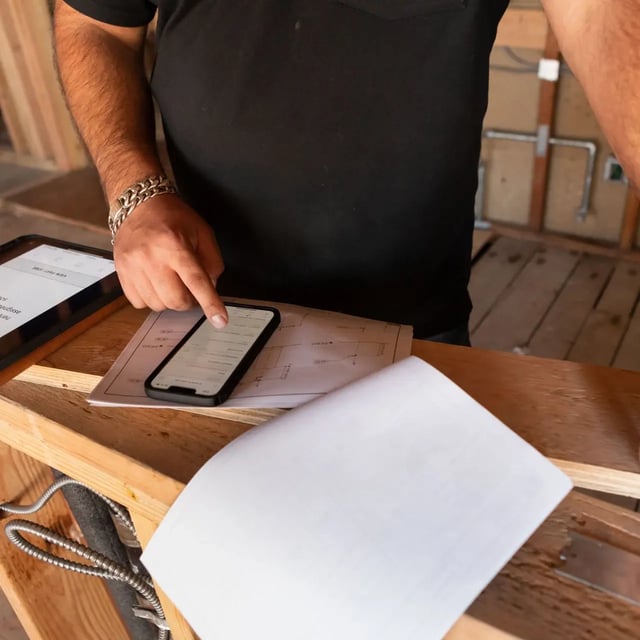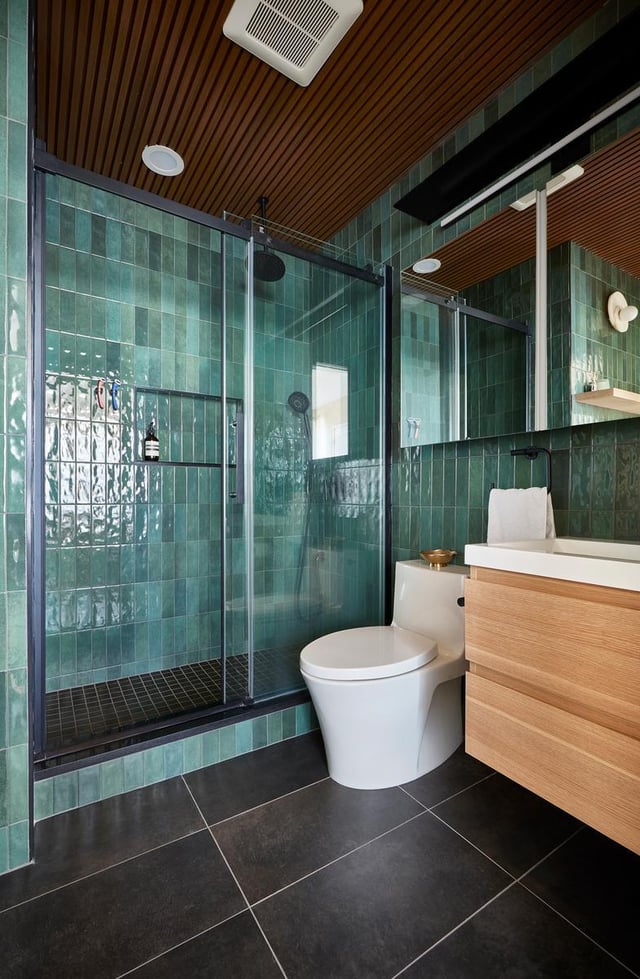
New Jersey
Essex County Kitchen Remodeling: Cost, Design, and Permit Guidance
11.11.2025


In This Article
Thinking about renovating your home in New Jersey? Get ready for an exciting financial journey because turning that "fixer-upper" into your dream home is an investment worth making! With the fun of designing a brand-new kitchen, selecting the perfect bathroom tile, and embracing a few unexpected upgrades (because they always bring character), home renovation in New Jersey can feel like planning a small wedding—except instead of champagne, you're getting stunning countertops and a space that's truly yours. But don't worry! We're here to break down exactly what you're in for and help you budget like a pro. So, let's dive into the ultimate guide to home renovation costs in New Jersey.
How much you’ll spend on your New Jersey home renovation really hinges on the depth of your renovation dreams. A basic update—think fresh paint, new flooring, and a bit of cosmetic sprucing up—will run you about $100 to $300 per square foot. But if you’re ready to dive into major changes like tearing down walls, overhauling the kitchen, or splurging on high-end finishes, you might be looking at $400 to $800 per square foot or even more.
For specific remodels kitchen renovations can set you back anywhere from $35,000 to $65,000, while bathroom updates typically range from $34,000 to $60,000. And, as always with renovations, be prepared for those pesky surprises—like hidden plumbing issues or electrical upgrades—that can push your budget higher. The silver lining? Getting multiple quotes from contractors can help you find the right fit and keep a bit of cash left over for that fancy backsplash you’ve been eyeing.
Learn More: How to Start Planning a Home Renovation
Renovation costs can vary as much as your renovation dreams. From labor and design to materials and those inevitable surprises, here's a guide to understanding what influences your home renovation budget.
Labor usually makes up a hefty chunk of your renovation budget—about 60% or so. The more complex your project, the higher the labor costs. Whether you're dreaming of tearing down walls or installing a fancy new soaking tub, you'll need a mix of pros like a general contractor, electrician, and plumber. So, get ready for those labor fees to rise with your renovation ambitions.
Considering hiring a designer? It's an extra expense but can save you from costly mistakes and help turn your vision into reality. Designers can assist with everything from choosing materials to planning layouts. And if you're only looking for a little guidance—like picking the perfect paint color—there are flexible options to fit your needs.
Expect materials to take up about 30% of your budget. We're talking flooring, cabinets, tiles, and appliances—every choice adds up fast.

Planning a gut renovation in New Jersey? Prepare for a comprehensive overhaul—walls, floors, ceilings, and possibly plumbing and electrical systems will all be up for grabs. This type of renovation gives you a blank slate but comes with a cumbersome price tag. On average, gut renovations in Northern New Jersey can cost between $400 to $800 per square foot or even more, depending on the scope and quality of finishes. For a 1,000-square-foot home, you’re looking at spending between $400,000 and $800,000. For a larger 2,500-square-foot space, costs can range from $1 million to $2 million.
If that feels a bit too intense, a non-gut renovation might be more your speed. This approach focuses on updating your space without major structural changes—think new paint, updated flooring, or a fresh look without tearing down walls. Basic renovations typically start around $100 to $300 per square foot, making it a more budget-friendly option for refreshing your home without going all in.
Whether you’re opting for a full gut renovation or just some surface updates, remember that final costs will depend on the specifics of your project. And don’t forget to set aside a little extra for those inevitable surprises that can pop up along the way.
There are a myriad of variables when arranging a renovation in New Jersey. Don’t forget to factor in the cost of permits, which can vary based on your town and the scope of your project. For minor updates—like a quick cosmetic refresh—you’ll need a basic permit. In places like Teaneck, the first $50,000 of your renovation budget will cost $30 per $1,000 for permits, so a $20,000 kitchen update would set you back around $600. If your budget exceeds $50,000, the cost drops to $24 per $1,000 for the next $50,000, and any amount over $100,000 will cost $22 per $1,000.
For more extensive renovations—like adding a new room, making structural changes, or increasing occupancy—you’ll need a more detailed permit. In Morris Township, permits start at $33 per $1,000 for the first $50,000 of your budget and range from $27 to $33 per $1,000 for the next $50,000. Projects over $100,000 will cost between $20 and $28 per $1,000.
In Toms River, the fee is $39 per $50,000 of the estimated cost, with an additional $25 for projects between $50,001 and $100,000, and $19 for anything over $100,000.
Although dealing with permits might seem like a hassle, they’re crucial for keeping your renovation on track and ensuring it meets all local regulations. Coordinate with your contractor and local department of buildings to ensure the necessary permits.
A key budget consideration when renovating in New Jersey is whether you're working with a "dry" or "wet" space. This isn't just a technical detail—it can have a big impact on your overall costs. Here's what you need to know:
Renovating wet spaces, like bathrooms, kitchens, or laundry rooms, tends to be on the pricier side. These areas are constantly exposed to water and humidity, which means you'll need specialized labor and materials. Costs can climb due to the need for plumbing, tiling, waterproofing, and durable, water-resistant materials. It's smart to hire experts who know their stuff—mistakes here can lead to costly repairs down the line.

On the other hand, dry spaces such as bedrooms, living rooms, and dining rooms are generally more budget-friendly. Without the need for plumbing or waterproofing, renovations in these areas are often simpler—think painting, new flooring, or electrical updates. This makes updating dry spaces easier on the wallet compared to their wet counterparts.
When it comes to renovating, considering your heating and cooling options is essential. Costs can vary widely based on the system you choose and your home's specifics. Here's a closer look at what to expect:
Installing a new heating and cooling system can be a copious expense. A basic system might start around $2,000, but more advanced setups can cost tens of thousands of dollars. The final price will hinge on the type of system you select and the size of your home.
Central systems are common in larger New Jersey homes. They tend to be more expensive due to the need for ductwork and high-capacity units, but they offer consistent temperature control throughout your entire home.
If flexibility and energy efficiency are your priorities, split systems or mini-splits could be a great option. These systems are ideal for individual rooms and are easier to install, especially in older homes lacking ductwork. They can also be more affordable upfront and help save on energy bills over time.
For a touch of luxury, consider radiant heating. This system involves installing heating elements under floors or within walls. Although the installation cost is higher, it provides the cozy comfort of warm floors during those chilly New Jersey mornings. If you're willing to invest a bit more, it might be worth the splurge.
Remember, it's not just about the initial installation costs—ongoing operating expenses are crucial, too. While energy-efficient systems might cost more upfront, they can lead to significant savings on utility bills over time, making them a worthwhile investment for the future.
Establishing a clear budget is key to ensuring a smooth renovation in New Jersey and avoiding those pesky surprise costs. A well-planned budget helps you prioritize your needs and identify where you can save. Here’s how to kick things off:
Before diving into your renovation, take a good look at your finances and set a practical spending limit. It’s easy to get swept up in grand ideas, but understanding your financial boundaries from the get-go will help keep your project on track.
Identify what’s most critical for your renovation. Which parts of your New Jersey home need the most attention? By setting clear priorities, you can allocate your budget to the essential elements and avoid overspending on less significant features.
To keep things manageable, divide your budget into categories such as labor, materials, design services, permits, and a contingency fund. A good guideline is to dedicate about 60% of your budget to labor, 30% to materials, and reserve 10% for unexpected costs.
Focus on the essentials first. Safety and functionality improvements—like updating electrical systems, plumbing, or structural repairs—should be your top priority before you move on to aesthetic upgrades.
Even with the best planning, surprises can arise. Allocate 10-20% of your budget for unexpected expenses. This way, you’ll be prepared for any surprises without disrupting your financial plans.
.jpg?width=2200&height=1467&name=Block_NJ_0082%20(1).jpg)
Choosing the right contractor is arguably the most important decision for your renovation. Your contractor will guide you through every stage of the project and help navigate any challenges that arise.
Selecting a contractor might seem overwhelming, but Block makes it easier by connecting you with up to three top-rated professionals from our exclusive network. Our comprehensive vetting process ensures each contractor:
You’ll get to meet these contractors during a site visit, easily compare their proposals, and choose the best fit for your renovation needs. Get a free consultation today!

Written by Block Renovation
What is the average cost per square foot for a home renovation in New Jersey?
How long does a typical home renovation take in New Jersey?
Do I need a permit for my home renovation in New Jersey?
Can I live in my home during the renovation?
What are some hidden costs I should be aware of?
How much does it cost to renovate a bathroom in New Jersey?
What is the process for getting a renovation permit in New Jersey?
What is the cost of hiring an architect or designer for a renovation project in New Jersey?
How can I ensure my renovation project stays on budget and on schedule?

Renovate confidently with Block
Easily compare quotes from top quality contractors, and get peace of mind with warranty & price protections.
Thousands of homeowners have renovated with Block

4.5 Stars (100+)

4.7 Stars (100+)

4.5 Stars (75+)

New Jersey
Essex County Kitchen Remodeling: Cost, Design, and Permit Guidance
11.11.2025

New Jersey
Essex County, NJ Bathroom Remodeling: Expert Guidance & Contractors
11.11.2025

New Jersey
Kitchen Remodeling for Cliffside Park NJ Homes
10.22.2025

New Jersey
Hoboken NJ Home Remodeling: Bathrooms, Kitchens & More
10.22.2025

New Jersey
Jersey City Bathroom Remodeling Solutions & Inspiration
10.22.2025
Renovate confidently